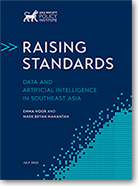Conclusion
There is little doubt that Southeast Asia as a region, and the five countries that we covered in this project, are embracing the transformative promise of data and AI. Most of that anticipation is focused on the utility of technology to extend the trajectory of economic development into the digital space. This is evident in the many national policies and strategies of Southeast Asian countries, as well as in the forward-leaning masterplans and blueprints of the Association of Southeast Asian Nations (ASEAN) as a group.
It is not just governments that are excited about digitalizing the region; the upbeat sentiment is also shared by the private sector and the people of Southeast Asia. The technology industry’s vote of confidence is reflected in large, long-term capital investments in and around the region, from submarine cables for faster data transfers, to data centers for even greater cloud storage capacity. Among the public, Southeast Asia’s strong e-commerce performance, even during the pandemic, is testament to how bullish consumers are about the future of the digital economy.
This project sought to push the envelope in thinking about the data-driven environment in Southeast Asia. In mapping the aspirations of five regional countries, we question what the end goal of data-driven optimization is and what it might be instead. We urge a reframing of the utility of data and artificial intelligence (AI) so that there is deeper consideration of the values underpinning buzzwords like an “inclusive digital economy” or “ethical AI.” We also invite deliberation on whether there are uniquely Southeast Asian values and viewpoints that countries can bring to the table in international discussions on technological rule-setting.
A relational rather than rational approach to technology, reflected in concepts like ubuntu among African scholars and scientists as well as buen vivir in Latin America, are already beginning to make their mark in conversations about inclusive data and the ethics of AI. We encourage Southeast Asian stakeholders to reflect similarly on their digital paths ahead and to look harder beyond conventional metrics of success.
Widening the aperture to include different knowledge systems and perspectives has profound policy implications. At the domestic level, it can enable Southeast Asian countries to ground their digital ambitions in their own, unique contexts, correcting structural inequities for a fairer and more accountable national vision. At the ASEAN level, it can help align a region-wide approach toward data and AI. At the same time, it can afford Southeast Asian nations the opportunity to carve agency and strategic autonomy as major power rivalry intensifies in the technological arena. Finally, at the international level, it can empower a distinctly Southeast Asian voice as standards, norms, and rules are being developed to govern the data-driven technologies that will shape the world.


